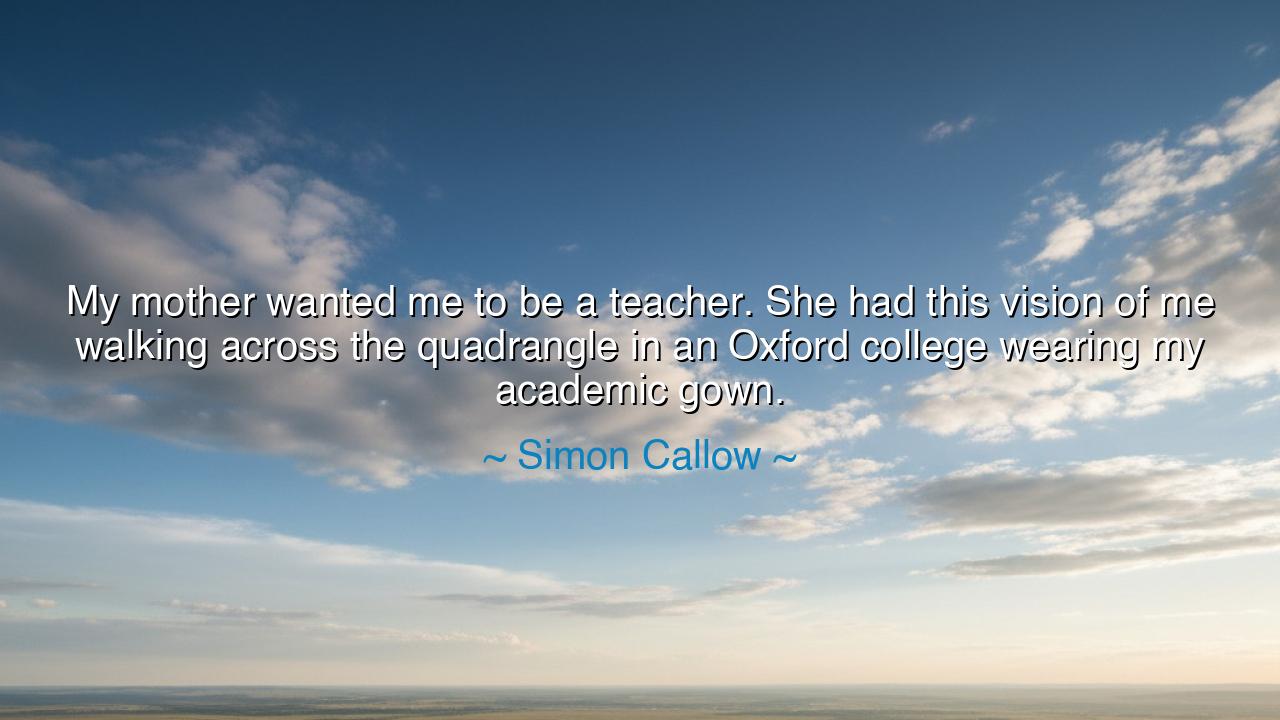
My mother wanted me to be a teacher. She had this vision of me
My mother wanted me to be a teacher. She had this vision of me walking across the quadrangle in an Oxford college wearing my academic gown.






When Simon Callow said, “My mother wanted me to be a teacher. She had this vision of me walking across the quadrangle in an Oxford college wearing my academic gown,” he spoke not only of his mother’s dream but of the eternal weight of parental hope. His words reveal the tender and sometimes heavy bond between generations—the yearning of a parent to see their child walk a path of dignity, stability, and respect. In this vision of the academic gown, the mother saw a symbol of wisdom and honor, a life of safety and esteem in the hallowed halls of Oxford. Yet behind it lies the timeless question: are we to live the lives dreamed for us, or the lives burning within us?
The origin of this vision is rooted in love. For centuries, parents have desired for their children what seems secure and noble, steering them toward professions like the teacher, the doctor, the scholar, or the judge. To Callow’s mother, the image of him as a teacher was not mere practicality—it was a dream of elevation, of belonging to the intellectual elite, of wearing the gown that symbolizes centuries of tradition. For her, Oxford represented not just education but immortality, a life etched into the noble continuity of academia.
History offers us many examples of this same pattern. Consider Charles Darwin, whose father dreamed of him becoming a clergyman, a man of respect and stability. Yet Darwin’s heart was captured by the mysteries of nature, and though he disappointed his father’s vision, he fulfilled his own calling—and in doing so, changed forever how humanity saw itself. So too in Callow’s words we hear the ancient tension: the pull of parental dreams and the push of destiny’s true path.
The ancients themselves spoke of this struggle. In the stories of Achilles, his mother Thetis longed for him to live quietly, hidden, safe from the doom of war. Yet his fate was glory upon the battlefield of Troy, though it meant an early death. Here too, the parent envisioned safety and honor in one way, while the child’s destiny called in another. This is the universal drama: parents dream in the language of protection, while children must learn to dream in the language of authenticity.
The meaning of Callow’s words is thus bittersweet. They show us the depth of a mother’s care, who imagined her son among the serene quadrangles, clothed in a symbol of permanence and order. But his very confession reveals that he did not follow that path. He became not a teacher of classrooms, but an actor upon the stage—a different kind of teacher, one who inspires through story and performance, not through chalk and textbooks. The mother’s vision was not fulfilled in form, but perhaps in essence: for art, too, instructs the heart and ennobles the soul.
The lesson for us is profound: honor the dreams of those who raised you, but do not mistake them for your own. Parental visions are gifts of love, but they are not chains of destiny. To live authentically is to accept their hopes with gratitude, yet to walk the path for which you yourself were fashioned. For in doing so, you may fulfill the deeper essence of their desire—not the image of the academic gown, but the reality of a life well-lived, meaningful, and true.
Practically, let us act with both reverence and courage. Children, listen to your parents’ hopes, for they spring from love, but do not silence the call of your own heart. Parents, offer your guidance, but release your grip, for your children belong not to your dream but to their own destiny. And all of us, whether young or old, must ask: am I wearing the gown that others imagined for me, or am I walking in the garments woven by my own soul?
Thus, Simon Callow’s words shine as a parable for the ages: parents may dream of Oxford gowns, but children must dream of the truth within themselves. To reconcile these dreams with gratitude and courage is to walk the path of wisdom, honoring the past while embracing the call of one’s own future.






AAdministratorAdministrator
Welcome, honored guests. Please leave a comment, we will respond soon